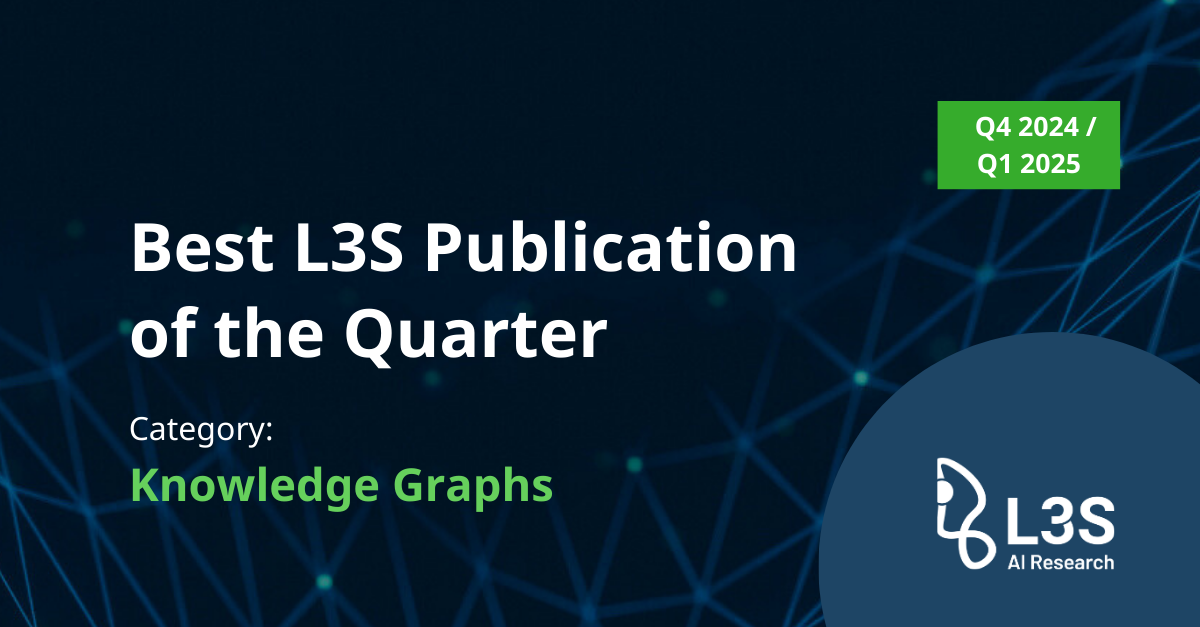L3S Best Publication of the Quarter (Q4/2024 – Q1/2025)
Category: Knowledge Graphs
From Genesis to Maturity: Managing Knowledge Graph Ecosystems Through Life Cycles
Authors: Sandra Geisler, Cinzia Cappiello, Irene Celino, David Chavez-Fraga, Anastasia Dimou, Ana Iglesias-Molina, Maurizio Lenzerini, Anisa Rula, Dylan Van Asschhe, Sascha Welten, Maria-Esther Vidal
Published in Proceedings of the VLDB Endowment, VLDB 2025 (Vision Paper)
The paper in a nutshell:
Organizations in healthcare, industry, and scientific research struggle to keep knowledge accurate, up-to-date, and trustworthy as data and knowledge continuously evolve. Our research introduces Knowledge Graph Ecosystems (KGEs)—a structured approach to organizing, modeling, and managing evolving knowledge. By defining clear lifecycle processes, we enable organizations to trace changes, validate and curate data, and model non-monotonic knowledge while providing the basis for AI-generated insights which remain transparent and reliable. This approach is essential for fields where knowledge evolution directly impacts decision-making and policy development.
Which problem do you solve with your research?
Data and knowledge ecosystems lack traceability, evolution management, and explainability, making it difficult to track changes over time. Our research formalizes Knowledge Graph Ecosystems (KGEs) and their lifecycle framework, ensuring transparent, structured, and well-documented knowledge evolution. This approach enhances trust and reliability in decision-making across healthcare, industry, and scientific research.
What is new about your research?
We present a novel formalization of the concept of Knowledge Graph Ecosystems (KGEs), integrating structured lifecycle management to ensure traceability, validation, and explainability—aspects that are often overlooked in existing Knowledge Graph (KG) frameworks. Unlike traditional KGs, which focus on static representations of knowledge, our approach enables continuous evolution, managing data provenance, semantic alignment, and dynamic interactions across ecosystem components. Additionally, we introduce a lifecycle-driven methodology that defines systematic processes for knowledge integration, quality assurance, and interoperability, addressing critical challenges in healthcare, industry, and scientific research. By providing a formal foundation for managing evolving knowledge, our work paves the way for more transparent, accountable, and scalable AI-driven decision-making systems.
What is the potential impact of your findings?
Our findings have the potential to transform how organizations manage and trust knowledge-driven ecosystems across healthcare, industry, and scientific research. By introducing a structured life cycle-driven approach to Knowledge Graph Ecosystems (KGEs), we enable traceability, interoperability, and explainability, ensuring that AI-driven insights are accurate, transparent, and accountable. This has direct implications for critical decision-making processes, such as medical diagnoses, regulatory compliance, and industrial automation, where trust in data is essential. Additionally, our approach provides the foundation to enhance data quality, provenance tracking, and dynamic knowledge integration, allowing organizations to adapt to evolving standards and regulatory requirements. Ultimately, this work lays the foundation for scalable, AI-powered knowledge management systems.
Paper link: https://rwth-aachen.sciebo.de/s/kE9SlaTaHvS4eq5


